If you live in a state where the temperatures dip below freezing in the winter, one of the best parts of the colder months of the year might be spending time outdoors on the ice. Whether you love ice fishing, ice skating, or hockey, a Massachusetts winter gives you the chance to get outside to enjoy unique cold-weather activities. Massachusetts has no shortage of lakes that freeze over in the winter. There are many scattered across the state. This article names just a few as examples of bodies of water in Massachusetts that do ice over.
Before we get started, it is important to know that there are many scenarios in which venturing out onto ice can be dangerous. Always check with your local authorities, park rangers, or regional experts to learn about the ice conditions before you walk or drive onto a lake that appears to be frozen. Before you head out, check out the State of Massachusetts ice safety guidelines.
1. Lake Ashmere

Located in the Berkshires of Massachusetts, Lake Ashmere freezes entirely from shore to shore.
©Todd C. // CC by 3.0 – License
Lake Ashmere, also called “Ashmere Lake,” is a small lake in rural Massachusetts. This lake is located in the western part of the state in Berkshire County and has a maximum depth of 24 feet and an average depth of 8 feet. This state-owned body of water is used primarily for recreation and has three summer camps located on its shores. In the winter’s cold temperatures, Lake Ashmere will often freeze over completely from shore to shore. This makes the quiet, small lake a peaceful, icy sight.
2. Lake Chauncy
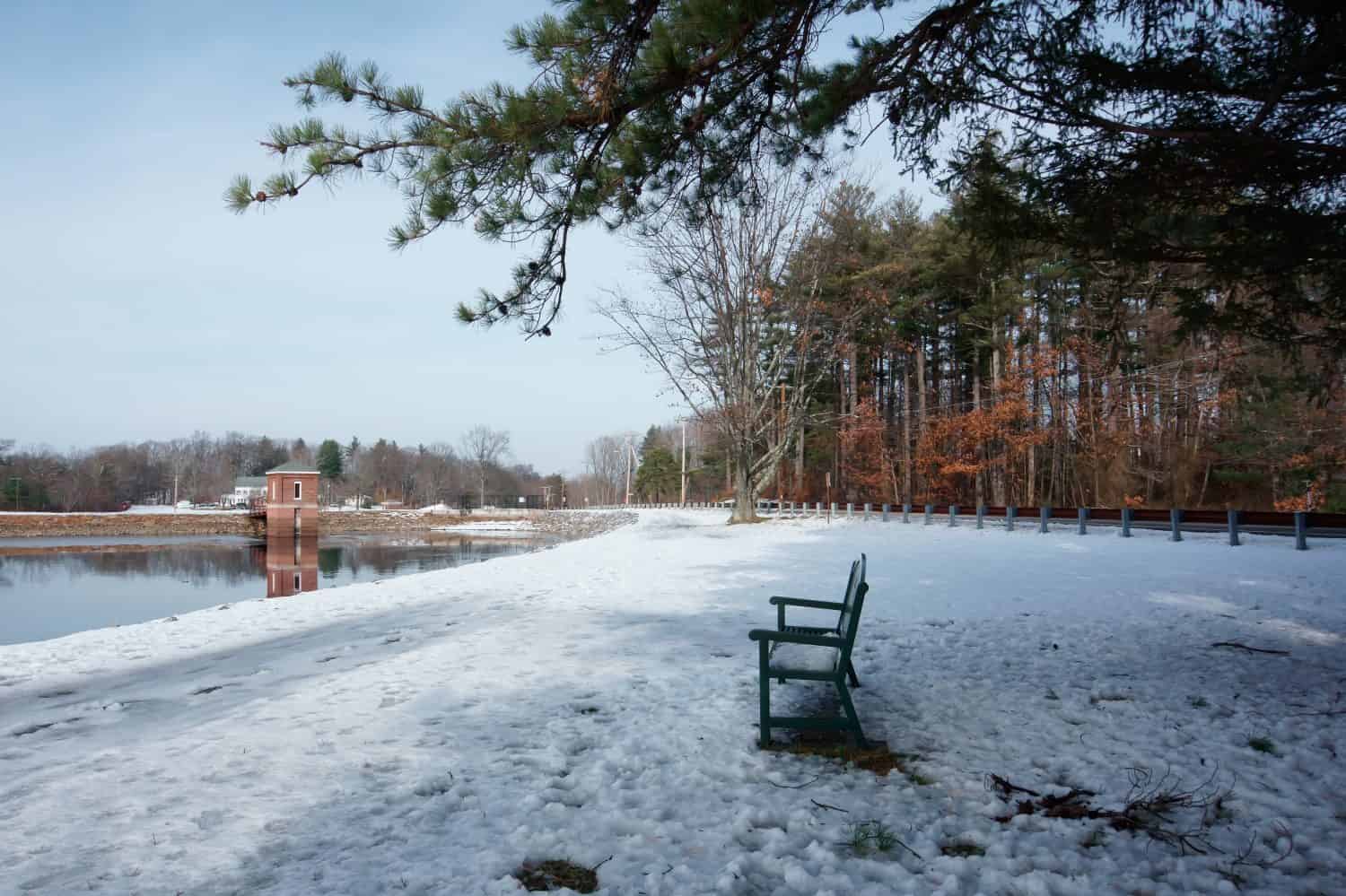
Lake Chauncy is in Westborough, Massachusetts.
©Yingna Cai/Shutterstock.com
In Westborough, Massachusetts, Lake Chauncy (also called “Chauncy Lake”) is an 182-acre body of water with an average depth of 14 feet and a maximum depth of 21 feet. When the lake freezes in the winter, the area enjoys a thriving ice-fishing scene of people drilling into the ice to catch prizes such as largemouth bass and pickerel. That makes a Massachusetts winter something to look forward to!
3. Sandra Lake
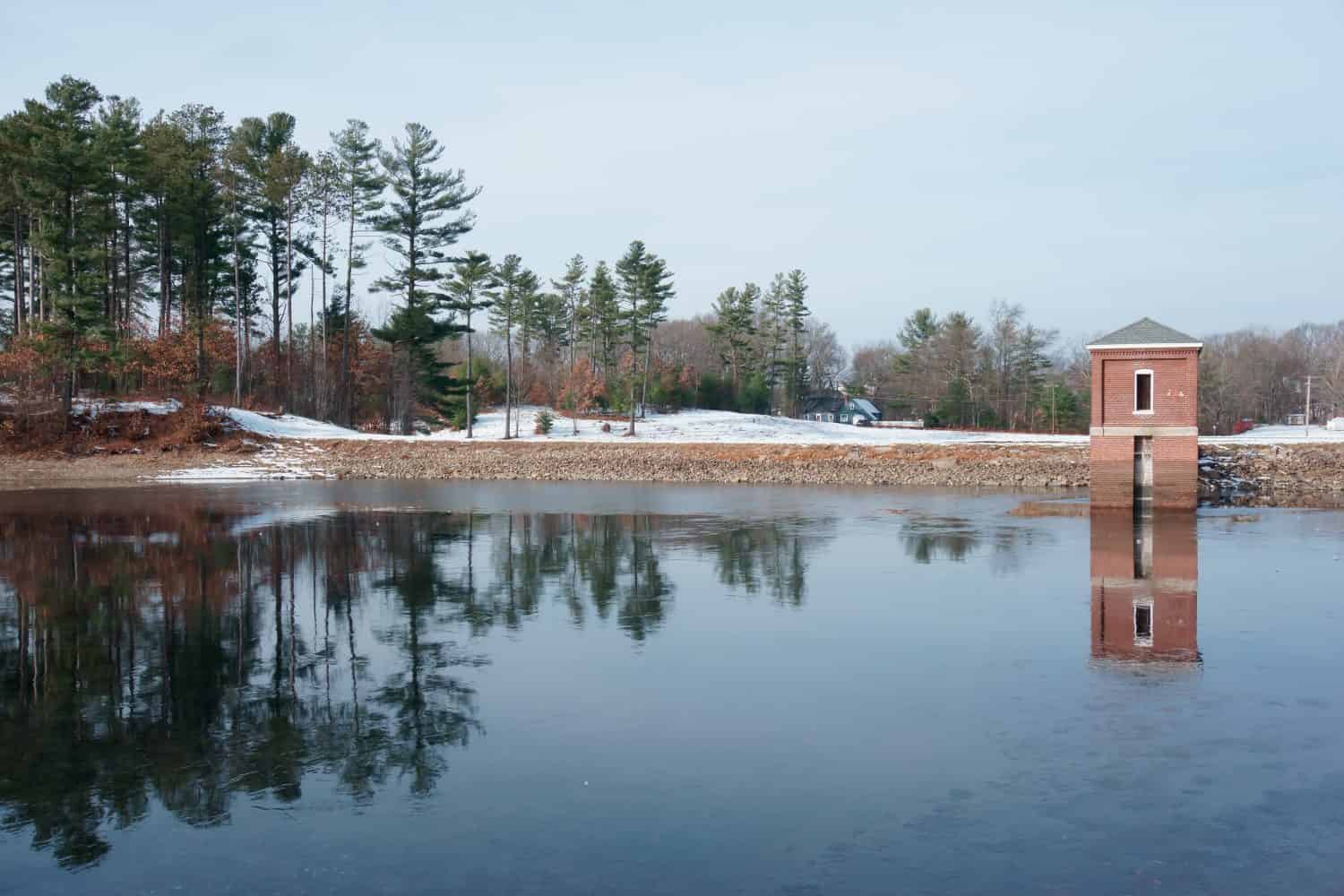
Sandra Pond Reservoir and Dam in Minuteman Park in Westborough, Massachusetts often freezes over in the winter.
©Yingna Cai/Shutterstock.com
Also located in Westborough, Massachusetts is Sandra Pond, a town reservoir on 144 acres of conservation land purchased to protect the town’s water supply. In the summer, Sandra Pond is a destination for fisherpeople looking to catch bass, black crappie, golden shiners, yellow perch, and other prime catches. However, in the winter, ice fishing derbies are what draw people from around the region.
4. Webster Lake
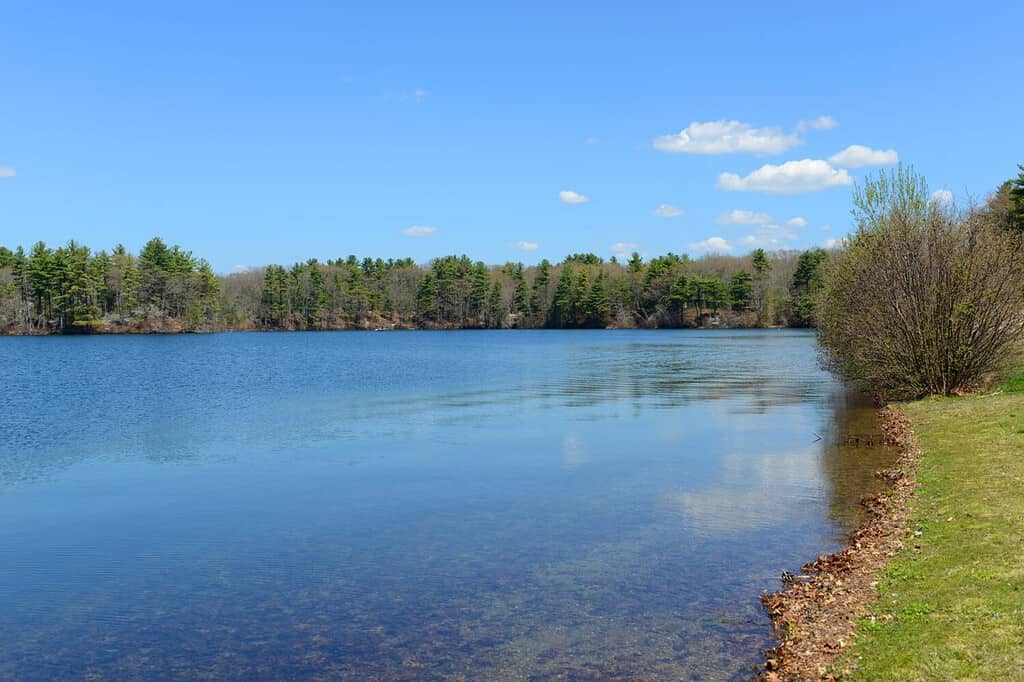
Webster Lake is also called “Lake Chargoggagoggmanchauggagoggchaubunagungamaugg.”
©Wangkun Jia/Shutterstock.com
In Webster, Massachusetts, Webster Lake is a spring-fed lake that often appears to have frozen over completely. This lake became famous far beyond its local community in northwestern Massachusetts for having the longest name of any geographic feature in the United States. In fact, “Lake Webster” is not its original name. This body of water is also called “Lake Chaubunagungamaug,” which means “lake divided by islands” in the extinct Algonquian language, Loup. However, even “Lake Chaubunagungamaug” is an abbreviated version of the full name: “Lake Chargoggagoggmanchauggagoggchaubunagungamaugg.” However, in recent years, the lake has also been called “Webster Lake.”
After a snowstorm, its icy top layer may also become covered in inches of snow. However, it is important to know that the Webster Fire Department advises that ice on this lake is not safe. Because Webster Lake is spring-fed, the lake experiences dramatic variations in ice thickness and the conditions can change with little warning. When snow covers the lake’s surface, it may become even more difficult to see changes in the ice thickness.
5. Pontoosuc Lake
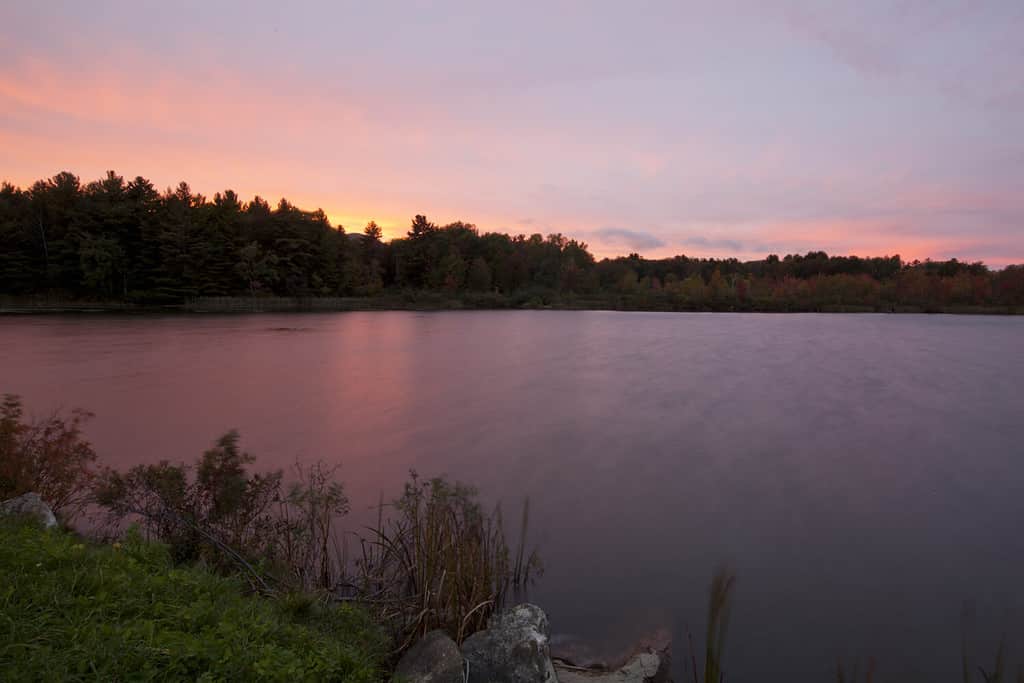
Pontoosuc Lake in Pittsfield, Massachusetts is open for year-round recreation.
©jdwfoto/Shutterstock.com
In Pittsfield, Massachusetts, Pontoosuc Lake is one of the most-loved lake destinations in the Berkshires region. This lake is known for having a large trout and largemouth bass population. Because of this, it is one of the most popular ice-fishing locations in the area. The 511-acre pond has an average depth of 11 feet, though this can change depending on the amount of rain.
6. Lake Mattawa
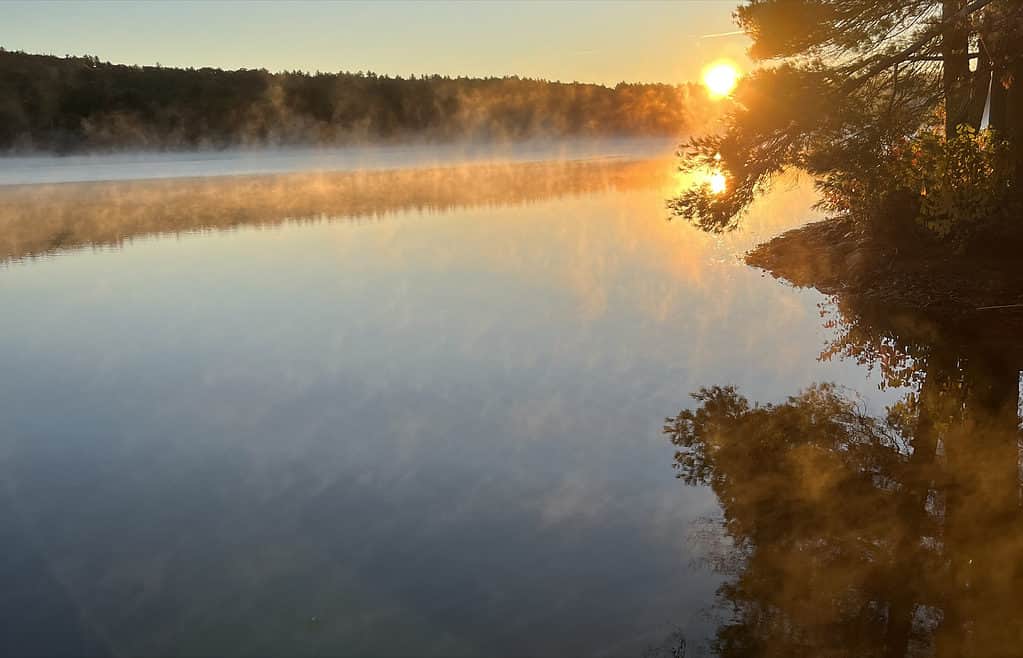
Lake Mattawa in Orange, Massachusetts has water with a crystal-clear appearance thanks to it being fed by numerous underwater springs.
©Scoot5842/Shutterstock.com
In Orange, Massachusetts, Lake Mattawa’s many underwater springs keep the lake’s water looking clean and clear. This 118-acre body of water is deeper than many others on this list. With a maximum depth of 43 feet and an average depth of 17 feet, you will want to check with local guides before venturing out to ice fish or skate on Lake Mattawa.
7. Lake Rohunta
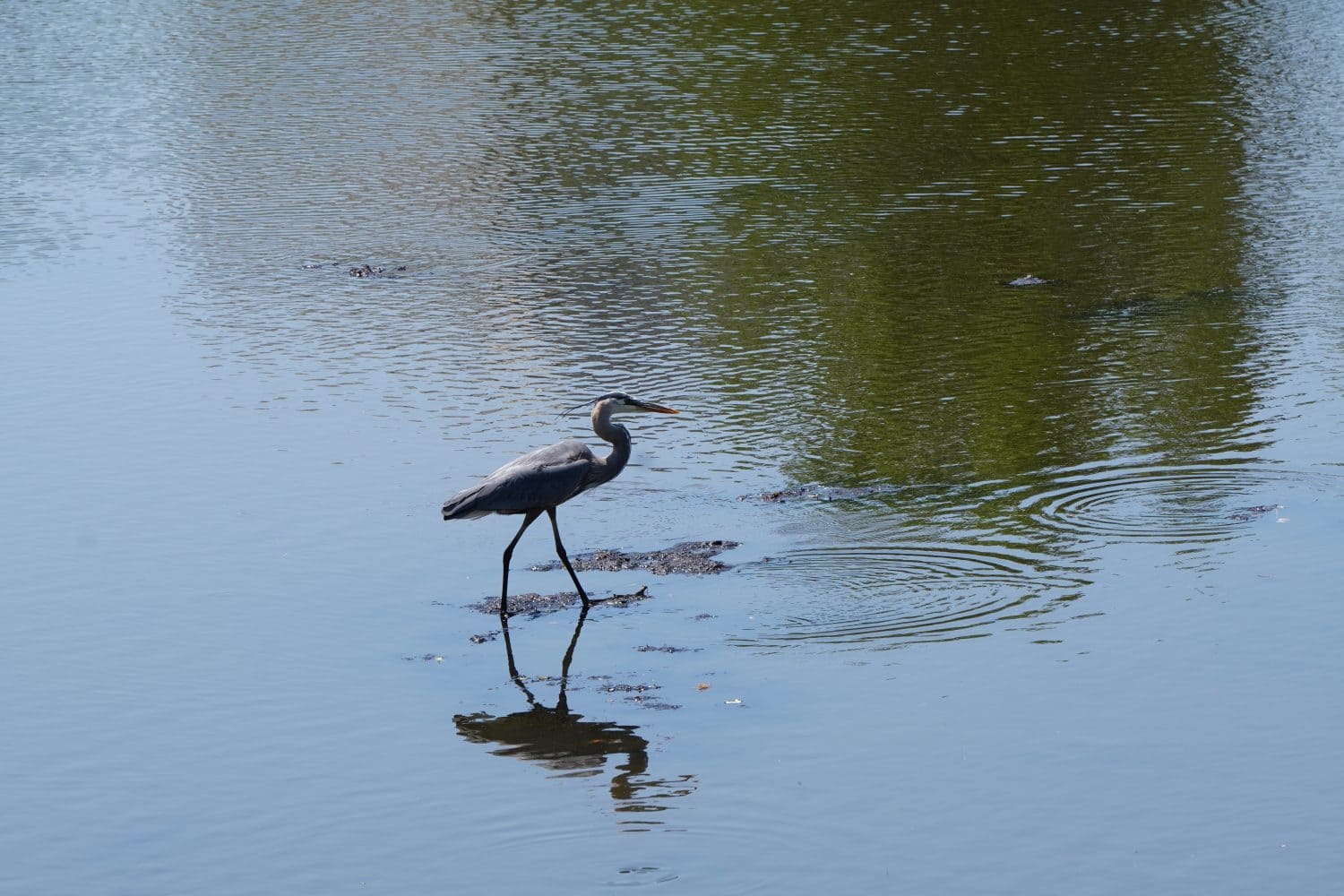
Lake Rohunta and other bodies of water near Worcester, Massachusetts, are prime spots for birdwatching.
©quiggyt4/Shutterstock.com
Not far from Lake Mattawa, in Worcester, is Lake Rohunta, another body of water in Orange, Massachusetts. Lake Rohunta is known for having clear water and plentiful bass. During the summer, its waters have abundant crayfish and golden shiner. In the winter, these become go-to baits for ice fishermen. This 383-acre lake has a maximum depth of 16 feet but is shallow in most places. In fact, it has an average depth of only 3.5 feet! This area is known for being an enjoyable destination for paddlers in canoes and kayaks, anglers, and birdwatchers.
The photo featured at the top of this post is © CO Leong/Shutterstock.com
Thank you for reading! Have some feedback for us? Contact the AZ Animals editorial team.






